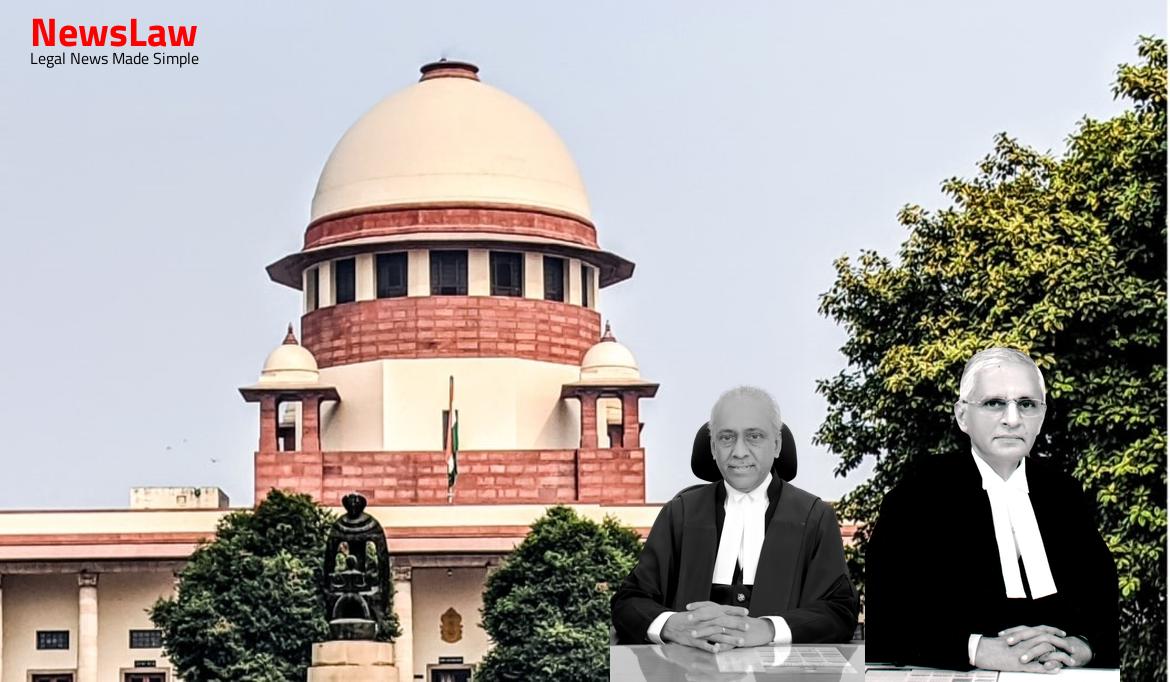In a recent legal case, the court delved into the complexities of jurisdictional issues raised in a transfer petition. The focus was on the court’s legal analysis regarding territorial jurisdiction and the power to try specific offenses. This blog post provides insights into the crucial role of jurisdiction in legal proceedings and the impact it can have on the validity of a trial.
Facts
- Police filed supplementary charge-sheets in multiple cases on various dates.
- Three loans sanctioned by the second respondent-Company while the petitioner was in service led to complaints.
- All complaints were lodged by the second respondent with the Station House Officer.
- The particulars of the loans and borrowers along with FIR details are provided in a tabular column.
- Charge-sheets were filed for alleged offenses under different sections of the IPC in various FIRs.
- A person implicated as an accused in three cases seeks transfer of the cases to a competent Court in New Delhi.
Also Read: Legal Analysis of Alleged Emission Cheating Scandal
Arguments
- The respondent contended that no wrong statement was made regarding the property offered as security for the loan granted to Zillion Infraprojects limited.
- The borrower, also the prime accused in the cases, did not seek a transfer, leading to the argument that the petitioner has no right to seek transfer based on lack of territorial jurisdiction.
- The learned Standing Counsel for the State of Haryana supported the respondent’s arguments and cited a relevant court decision.
- The petitioner was appointed in 2016, resigned in July 2018, and has filed an application under Section 340 of the Code of Criminal Procedure for perjury against officials of the respondent.
- The question of whether any part of the cause of action arose within the local limits of jurisdiction in Gurugram was highlighted, with the respondent asserting it as a matter of fact to be established by evidence.
- The respondent, a non-banking finance company, is the de facto complainant in the criminal cases being considered for transfer.
- The petitioner, upon appointment, joined the Delhi office of the respondent company and was later transferred to Mumbai.
- The petitioner argues that the entire cause of action for each case arose in different locations – Delhi, Indore, and Surat, respectively.
- The loan agreements for all three cases indicate the place of execution of the agreement and the branch office of the lender to be in specific locations.
- There are discrepancies in the addresses provided by the complainant regarding their office location in Gurugram.
- The petitioner’s counsel contends that the complainant misrepresented having an office in Gurugram, leading to perjury.
Also Read: Authority of University Syndicate in Affiliation Matters
Analysis
- Sections 188 and 189 of the Code of Criminal Procedure deal with offences committed outside India.
- Section 461(l) focuses on the offender rather than the offence.
- The jurisdiction of a criminal court is typically based on the offence or the offender in specific cases.
- Section 462 of the Code of Criminal Procedure deals with saving clauses similar to Section 531 of the Code of 1898.
- Offences under the IPC may be tried by the High Court, Court of Session, or any other Court as per the first schedule, as stated in Section 26 of the Code of Criminal Procedure.
- Proceedings void under Section 530(p) of the Code of 1898.
- Jurisdiction in civil cases differs from jurisdiction in criminal cases in terms of determining factors.
- Irregularities in proceedings under Section 461 can make the proceedings void.
- Differences between Section 460 and Section 461 in terms of the use of ‘offence’ and ‘offender’.
- Significance of Sections 28 and 29 of the Code of 1898 and Section 26 of the Code of 1973 regarding jurisdiction based on the offence.
- Territorial jurisdiction in civil cases versus criminal cases.
- The power of a court to try an offence is governed by Clauses (a) and (b) of Section 26.
- A proceeding void under Section 461 cannot be saved by Section 462.
- Section 460 lists out 9 irregularities which may not vitiate the proceedings if done in good faith by the Magistrate.
- Section 461 lists out 17 irregularities which will make the whole proceedings void if done by the Magistrate.
- Clause (l) of Section 461 states that if a Magistrate not empowered by law tries an offender, the proceedings shall be void.
- Section 462 saves proceedings conducted in the wrong sessions division, district, or local area if no failure of justice has occurred.
- Various sections from 177 to 184 elaborate on jurisdiction rules for criminal courts in inquiries and trials.
- Section 186 empowers the High Court to decide the district for inquiry or trial when multiple courts have taken cognizance of the same offense.
- Section 187 discusses a Magistrate’s powers when an offense committed outside their jurisdiction cannot be inquired into or tried within their jurisdiction.
- The principles of jurisdiction for criminal courts can be summarized as per the provisions in Chapter XIII of the Code of Criminal Procedure, 1973.
- In the case of Raj Kumari Vijh Vs. Dev Raj Vijh, the issue of jurisdiction was raised regarding the stage at which an objection to territorial jurisdiction can be raised and considered by the court.
- The Calcutta High Court in Ramnath Sardar Vs. Rekharani Sardar clarified that objections to territorial jurisdiction should be dealt with by the Magistrate when raised in any proceeding, before any decision or finding is made.
- The Supreme Court distinguished between the jurisdiction with respect to the power of the court to try certain offenses and territorial jurisdiction.
- Territorial jurisdiction was deemed a matter of convenience while the power of the court to try specific offenses was considered crucial.
- The Court emphasized that any transgression in the power of the court to try specific offenses would invalidate the entire trial.
- When a controversy solely concerns the territorial jurisdiction of a Magistrate who otherwise has the power to try an offense, it may be covered by the saving clause under Section 462 of the Code of Criminal Procedure.
- Section 461(l) and Section 462 of the Code deal with the voiding of proceedings if a court lacks the legal power to try an offense or an offender.
- The determination of jurisdictional issues depends on evidence presented, and territorial jurisdiction must adhere to the rules outlined in sections 177 to 184 of the Code.
- Courts trying offenses are obligated to address jurisdictional issues raised before them.
- The cases at hand involved a territorial jurisdiction issue, and the Magistrate concluded that he had jurisdiction to hear the application.
- An inquiry in the State of Uttar Pradesh Vs. Sabir Ali explored the validity of a conviction and punishment by a first-class Magistrate under the Uttar Pradesh Private Forest Act, 1948, in light of Section 15(2) of the Special Act.
- In certain circumstances, the Court cannot order transfer based on lack of territorial jurisdiction before evidence is presented.
- Facts related to the place of the offence or other matters covered by Sections 177 to 184 of the Code must be established through evidence.
- The decision on territorial jurisdiction depends on facts that need to be proven through evidence.
Also Read: Court’s Legal Analysis: Stay on Trial Lifted and Trial Ordered to Proceed Expeditiously
Decision
- Both parties can raise the issue of territorial jurisdiction.
- Evidence can be presented on questions falling within Sections 177 to 184 read with Section 26 of the Code.
- Transfer petitions are dismissed.
- No order as to costs.
- Transfer petitions are liable to be dismissed.
Case Title: KAUSHIK CHATERJEE Vs. STATE OF HARYANA (2020 INSC 568)
Case Number: T.P.(Crl.) No.-000456 / 2019



